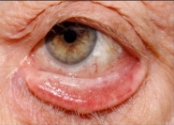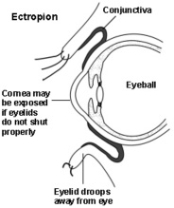Ectropion
An ectropion is where part or all of the lower eyelid turns outwards away from the eye. Someone looking at you would be able to see part of the inner surface of the affected eyelid.
What is the cause of an ectropion?
In Australia, ectropion mainly occurs in older people. It is thought that the small muscles around the eyelid become weak with ageing. In most cases there is no other underlying problem.
Chronic sunlight exposure can also lead to tightening of the lower lid skin, which drags the lower lid down.
There are various less common causes that can affect people of any age. An ectropion may be caused by any condition that causes scarring of the eyelid or near the eyelid. For example, a burn, infection, tumour or injury to the eyelid.
Also, any condition that causes weakness of the facial muscles may also include weakness of the eyelid and cause an ectropion.
What are the symptoms of an ectropion?
One eye alone may be affected. However, in the common age-related ectropion, often both eyes are affected.
- The inner lining of the eyelid that droops forward may become dry and sore.
- It is common for the affected eye to become watery. The part of the eyelid next to the nose usually droops the most. This is next to the tear duct where tears normally drain into the nose. The drooping eyelid may prevent the tears from draining properly, and the eye may become constantly watery. Tears may roll off the drooping part of the eyelid.
- Damaged cornea. The eyes may not be able to close properly if you have an ectropion. Therefore, the cornea (the front of the eye) is not fully protected and may get damaged. A corneal ulcer may develop. The cornea is vital for vision and a damaged cornea may affect eyesight.
What is the treatment for an ectropion?
The usual treatment is an operation to 'tighten' the skin and muscles around the eyelid. Treatment usually works well. The best results are obtained if the condition has not become too severe. More extensive plastic surgery may be needed in severe cases.
If you cannot shut your eye properly, whilst awaiting an operation you may be prescribed some lubricating eye ointment to help protect the cornea.
If your ectropion causes watery eyes, when wiping your eyelids do it in a direction up and in (toward the nose). This prevents you from pulling the eyelid downward and making the ectropion worse.



